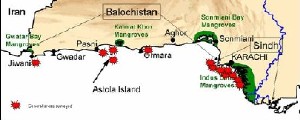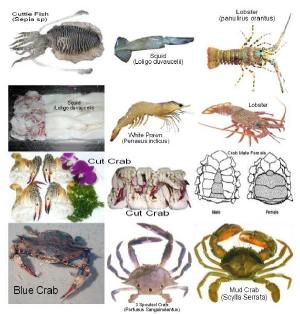Guest Post by A.R. Rafiq
 A couple of weeks ago the European Union announced a ban on all fish imports from Pakistan – worth more than US$ 80 million annually – because of poor quality products. According to the newsreport in The News:
A couple of weeks ago the European Union announced a ban on all fish imports from Pakistan – worth more than US$ 80 million annually – because of poor quality products. According to the newsreport in The News:
The government has finally received a verdict from the European Union, which informed Pakistani fishery authorities about de-listing of all the processing factories on quality grounds, effectively putting a ban on more than $80 million worth of exports. The fisheries sources confirmed the initial letter of the EU, which asked Pakistani authorities to stop consignments from the country to the 27-nation bloc, as they would not
be accepted after April 12… An official at the federal Ministry of Food, Agriculture and Livestock (MINFAL) said [that]… all the 11 seafood-processing units had been de-listed, which were earlier certified by the EU.
A three-member team of the EU’s FVO visited Karachi fish harbour in January 2007 to check fisheries’ facilities and quality of seafood being exported to its member countries. This trip was the second in two years after 2005. In February 2005, the EU team wrapped up its visit on warnings that Pakistani authorities should maintain seafood quality as per the set standards otherwise they would lose their largest seafood export market. But it appears nothing has changed in the time between, as irresponsible attitude and least interest of the institutions concerned made the country to pay the price second time in two years.
“The EU is the largest single market of the Pakistani,â€Â? said Sardar Hanif Khan, Chairman of Pakistan Seafood Industry Association (PSIA). “It would definitely hit almost half of the exports from the country and ultimately affect target negatively by the end of current financial year.â€Â? The EU decision sent ripples right from export bodies to the government institutions but poor fishermen appear to be main loser of the situation. “It is really very critical situation I believe,â€Â? said Ahmed Zameer Advocate, Director Vigilance at Fishermen Co-operative Society – a Sindh-represented body, which looks after fisheries operations. He said the federal government was responsible to maintain quality standards required by the EU. The federal institution failure would cause serious set back to the exchequer and endanger employment of hundreds of fishermen.
The State Bank of Pakistan in its report had informed that seafood exports were at $160 million by June 2006 up from $138.94 million exported during 2004-05, as the EU countries remained the largest buyers of the Pakistani products with more than 50 per cent share in total shipments.
I am of mixed feelings on this issue. The loss of the EU seafood market is a major blow to Pakistan’s economy. However, from an environmental and social prospective this can be seen as an opportunity. An opportunity to re-examine the fisheries and seafood export policies and slow down the industry – thus allowing the local marine wildlife an opportunity to play catchup.
 As a result of indiscriminate fishing and trawling and a lack of government regulations the fish population along the coastline has been severely depleted. Thus, harming the marine wildlife and natural ecosystem. That is an ecosystems which local fishermen have been part of for centuries.
As a result of indiscriminate fishing and trawling and a lack of government regulations the fish population along the coastline has been severely depleted. Thus, harming the marine wildlife and natural ecosystem. That is an ecosystems which local fishermen have been part of for centuries.
Some 20 years back there was an abundance of fish along the Karachi coastline. I have on numerous occasions been witness to boats arriving at the French Beach (Bulehjo) laden with large amounts of fish, in all shapes and sizes. You had “surmai” that that was longer than your arms length. All this was caught along the Makran Coastline (From Karachi to Gadiyani).
Other than large Surmai fish, you had unimaginable schools of parrot fish and groupers. Grouper is a rock fish once found in abundance right on the shore – now you talk to fishermen and local scuba divers they say the coastline is like a barren waste land. The the marine life is virtually non existent.
This devastation is primarily due to foreign trawlers that come into Pakistani waters and literally scrape the sea floor, lifting up everything that comes in the way of their gigantic industry grade nets.
As a result an ancient way of life, where man and nature once lived in harmony is fast disappearing. No thanks to the local, provincial and federal authorities.
AR (Abdulrahman) Rafiq is a technology professional in Silicon Valley and maintains multiple blogs including The Rabita Zone.



















































[…] Download Plan More @ pakistaniat.com […]
very informative site
Qanetah, the link indicated by you doesn’t show up,,,,,,could you please see to it or paste it on this board?
thank you, Qanetah. It’s high time that fisheries sector is got rid of political influences. It’s only due to these political pressures that ”closed season’ is not fully observed nor all governing rules are adhered to. Inter-departmental non -co-ordination and non-coperation continues to do more harm than good to the national fisheries sector. There should be just one Fisheries Authority to cater the needs of the industry.
As for the fishermen, i would like to state that fishermen work on fishing boats on ”partnership” basis similar to ”hari’s” in agriculture. despite this they borrow handome loans which they never return from the ”absentee landlord—-owners of fishing trawlers”) Therefore, i dont agree with their hue and cry for compensation during off seasons.(if there is an off season as such). As for the fishermen who own their own boats—-small or big…….they work on them with their family members or people of their clans. they fish the year round and there is no need for compensating them Alternatively, every fishermen should be compelled to make a nominal contribution to a govt authority after each cruise towards ”premium” for self insurance or base for taking loans in case of need or some contingency. Fishermen are not beggars and not so poor as to live on charity.
We waste our time and energy debating about religion when here are teh things that really mean something to people’s everyday life…. what messed up priorities